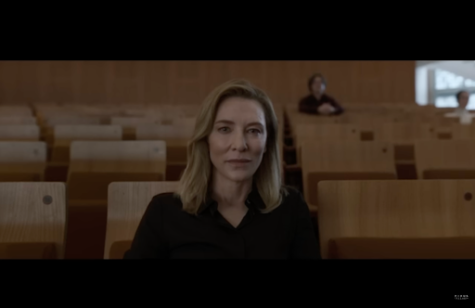
“Tár,” is now available for audiences to stream on Peacock, the film was written and directed by Todd Field, a name that many people may not have heard. Field went sixteen years in between directorial credits, his last feature film was the Oscar-Nominated “Little Children,” in 2006.
In the intervening years, Field directed a handful of commercials, and worked on screenplays. He returned to movies in 2022 with a sprawling script, and two-time Oscar winner Cate Blanchett in the starring role.
“Tár” is an act of provocation, a purposefully-agitational story made up of entirely jagged edges. For 157 minutes, Field shoves his audience into tense conversations about the one percent, cancel culture, power dynamics, artists and obsession.
Field earned two Oscar nominations for best director and best original screenplay. But for as lifelike and dense as Field’s script is, the entire project orbits around a mammoth, Oscar-nominated performance by Cate Blanchett.
Blanchett inhabits the vividly rendered fictional central character Lydia Tár. Lydia is a classically trained and critically-lauded classical music conductor; she’s also a mother, a wife, an adjunct professor at Juilliard, and a quasi-celebrity.
Blanchett plays Lydia with a collection of tics, jitters, and contortive facial expressions that camouflage, or reveal a wide range of emotions throughout the film.
The film opens, with the closing credits. A montage that lasts a handful of minutes and highlights the behind-the-scenes employees of “Tár,” everyone from camera operators to executive producers. From there, we jump to a fictionalized New Yorker talk with Lydia Tár, and Adam Gopnik. The scene briskly and effectively places the audience into Field’s highfalutin world of wealth and classical music, also serving as a much-needed introductory exposition.
The film becomes markedly more ambiguous from here, as we follow Lydia’s personal and professional spiral into controversy and chaos without further exposition or simplified language. “Tár,” is littered with a litany of technical terms, and long-winded conversations about “Berstein” and “Bach.” Jargon and dialogue that’s likely indecipherable to most audience members, but a creative choice that makes the character seem all the more realistic.
Lydia is unrelenting, some would argue sociopathic, and unconcerned with emotions, people, and opinions she views as beneath her. Very much cut from the same archetypal “Type A,” cloth as a number of formerly powerful men canceled or imprisoned during the “Me Too,” movement, Lydia’s gender and sexual orientation seem calculated, and pointed.
“Tár” is, at its core, a story about immensely talented, narcissistic people, and how these people leverage their power in an effort to maintain their superior societal footing, and positions of power. Moral dissonance and corruption can happen in any professional context, whether that person is gay or straight, male or female, isn’t relevant. What is relevant are their actions.
The skeleton key to understanding Tár,” and where the movie turns on its head, is a scene in the classroom at Julliard. A scene where Lydia confronts a student about “Bach,” and the relevancy of the artist’s personal life, when considering his work.
Blanchett berates the student while playing Bach on the piano, and menacingly walks around the classroom. The facade of Lyida’s public persona begins to crack, and the audience can clearly see the aggression underneath. Some of Field’s best writing is showcased here, with razor-sharp lines like, “If Bach’s talent can be reduced to his gender, birth county, religion sexuality, and so on, then so can yours,” and “Unfortunately the architect of your soul appears to be social media” being fired toward the student at a rapid, staccato pace.
The academic undressing contributes to the cancel culture portion of the screenplay and leads to the most unpredictable third act in recent memory. A sequence that sparked a surplus of think pieces, and conspiracy theories, all of which miss the broader point.
When discussing Bach in the classroom, Lydia says, “He knows that it’s always the question that involves the listener. It’s never the answer, right?”
This is the only line in the film that feels closer to Field than it does Lydia Tár. Almost as if Field is commenting on the opacity of his own artistic output.
“Tár,” is chalked full of questions, the sparsity of its answers is what makes it so unique.
What happens to Lydia Tár is ultimately open to interpretation, as is the resonance of Field’s overall message. Still, the puzzle pieces are there for anyone who wants to attempt to analyze or assemble them.







